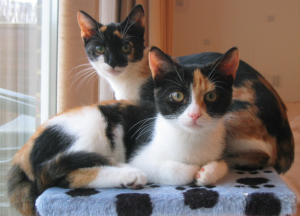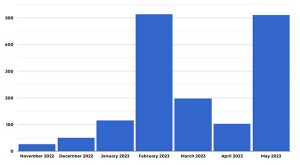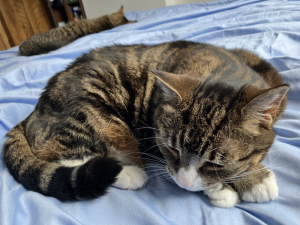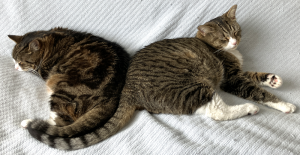As I thought it might, my current period of underemployment is drawing to a close and I am soon about to be very, very busy indeed. So this newsletter is going to move to a fortnightly schedule, alternating every other week with Word Count.
Meanwhile, don’t forget that bestselling crime writer Alex North is joining me at 19:00 BST on Thursday 8 June to talk about the craft of writing, his rollercoaster career, and what happens when he gets the wobbles halfway through writing a book. The webinar’s open to all subscribers, with the recording and transcript available afterwards to paid members.
Creativity is the eternal quest to close the gap between imagination and execution.
Back in 2010, radio host Ira Glass did an interview with Current TV, a short-lived American TV channel, about the process of putting together human-interest stories for the radio program he hosts, This American Life, along with some advice for early career radio producers. The interview is still available on YouTube in four parts – one, two, three, four.
At some point, years after the interview was broadcast, Part Three caught light online. Suddenly, folks were taking the audio from the interview and illustrating it. It was all over social media. I have watched it many times in the intervening years, because Glass speaks to something absolutely fundamental about the creative process. It’s worth watching the full video, but here’s a cut down version:
We all have a vision for how we want our creative endeavours to turn out. We work towards that vision, often for years. And yet our output falls far short of what we intended.
This is what you might call ‘The Taste Gap’.
Glass’s talk hits home so hard not because he’s saying anything we don’t already know, (we pretty much all know that we aren’t as good as we want to be), but because he normalises it – we all have this problem; he suffered particularly badly – and gives us an answer – plough through, keep going and keep learning.
What Glass is talking about, really, is the Four Stages of Competence and getting stuck between Stages Two/Three and Four. From Wikipedia, the Four Stages of Competence can be described as:
Stage 1: Unconscious incompetence
The individual does not understand or know how to do something and does not necessarily recognize the deficit. They may deny the usefulness of the skill. The individual must recognize their own incompetence, and the value of the new skill, before moving on to the next stage. The length of time an individual spends in this stage depends on the strength of the stimulus to learn.
Stage 2: Conscious incompetence
Though the individual does not understand or know how to do something, they recognize the deficit, as well as the value of a new skill in addressing the deficit. The making of mistakes can be integral to the learning process at this stage.
Stage 3: Conscious competence
The individual understands or knows how to do something. It may be broken down into steps, and there is heavy conscious involvement in executing the new skill. However, demonstrating the skill or knowledge requires concentration, and if it is broken, they lapse into incompetence.
Stage 4: Unconscious competence
The individual has had so much practice with a skill that it has become “second nature” and can be performed easily. As a result, the skill can be performed while executing another task. The individual may be able to teach it to others, depending upon how and when it was learned.
Going through Stage 1, Unconscious Incompetence, is relatively painless, because you aren’t aware of your incompetence and therefore can’t judge yourself for it (see also Dunning-Kruger). But as soon as you start to become aware of how much you still have to learn and how far short of ideal your actual output falls, you enter the excruciating pain of Stage 2. Even as your skills improve, as you begin to enter Stage 3, you’re still not as good as you want to be and every new thing you learn just emphasises your shortcomings.
Congratulations, you have entered The Taste Gap.
You are aware that your imagination is better than your execution, and you probably beat yourself up every time you finish something because all you can focus on is how it isn’t as good as you hoped it would be. You’re eager to make it to the final stage of Unconscious Competence, where everything comes easily because your skills are just that sharp, but you also know that you have to battle your way through Conscious Competence first, where it’s all hard work and sweat.
For radio journalists, or for short story writers or others who create at the smaller scale, Glass’s advice to finish a piece every week or every month and hone your craft through repetition and incremental improvement is good. But a single novel might take three or five or seven or over a dozen years to write. You can’t win on volume.
Instead, you have to learn everything you can about the craft of writing from others who’ve written more. Whether that’s taking creative writing courses, or reading books about writing, or joining a critique group, or hiring in a professional story editor, the most efficient way to develop your skills is to seek expert help. And you have to hope that next time round, which might be years away, you will still remember the stuff you learnt this time round.
You also have to be kind to yourself. If we had the stats to see such things, I think we’d find that people in Stage 3 have produced many, many great works.
At a gig in Caerdydd in 1993, musician Neil Finn said, “Perseverance will win through where talent falls short”. He was making a self-deprecating joke, but he was also (knowingly or not) talking about ploughing through Stages 2 and 3, when you might feel like a talentless hack, but what you’re actually doing is the hard work of learning. There is gold in them there hills, it’s just difficult to extract.
Indeed, I would suggest that few authors even get near to stage four, not because they aren’t capable, but because they don’t have the time to devote to internalising all of the skills needed. Storytelling is complex. There’s a huge amount to learn about plot, pacing, character, relationships, structure, dialogue, description, action, prose, and everything else that goes into a great novel, but most authors are earning on average £7,000 per year and have to have another job to make ends meet.
Where does the time come from to study all those skills and write? Given a choice, most early-career authors write and try to pick the rest up as they go along.
Key to the whole endeavour, I think, is self-awareness, determination, and self-compassion. Be aware of where you can improve, constantly strive for mastery, keep at it, but don’t self-flagellate. And remember:
In the eyes of those who anxiously seek perfection, a work is never truly completed—a word that for them has no sense—but abandoned; and this abandonment, of the book to the fire or to the public, whether due to weariness or to a need to deliver it for publication, is a sort of accident, comparable to the letting-go of an idea that has become so tiring or annoying that one has lost all interest in it. – Paul Valéry, 1933 (translated by Rosalie Maggio)
And to paraphrase Alan Schneider, the only perfect book is the one you haven’t written.
{ Comments on this entry are closed }





















